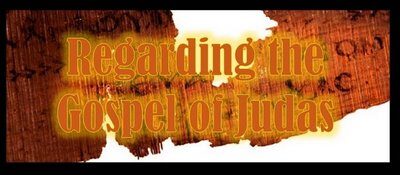Introductory Musings:
This essay will be parsed into the following segments:
Part 1: Introductory Musings Part 2: Substandard Double Standard Part 3: Pop-Cultura Ex-Cathedra Part 4: Which Came First, the Orthodoxy or the Heresy? Part 5: AEON SOTER – Some Gnosis of Gnosticism Part 6: Examining the Text of The Gospel of Judas
Part 7: Canonization Controversy
I have come to believe in the witness of The Gospel of Judas and accept it as authoritative, historically valid and theologically orthodox. That is, in as far as it presents us with a description of some of the beliefs of the Gnostics that lived circa a century and a half after the time that Jesus walked the Earth yet, not as Christian doctrine.
To those of us who keep up with such matters the discovery of a The Gospel of Judas came as no surprise. As soon as we heard about it we knew what is was-a Gnostic writing dated to, at least, a century and a half after the time of Jesus. The The Gospel of Judas is part of the Codex Tchacos (named as such after Frieda Nussberger-Tchacos who purchased it in New York) and is actually a fourth century manuscript. We also anticipated the reaction to it from the realm of secular and liberal scholars/theologians.
This reaction is that the New Testament has been discredited, challenged or augmented. Some liberal scholar/theologians actually claim that the New Testament has just been enhanced by the discovery of this gospel that the manipulative church censored out of its cannon. A panel of scholars/theologians was asked what will be told to children in Sunday school on the weekend after this revelation. They should be told the simple truth: one, two or three centuries after Jesus resurrected a group known as the Gnostics sought to place their, un-Jewish and un-Christian, beliefs into the mouth of Jesus and the apostles. Of course, none of these Gnostics had walked with, nor talked with, nor heard, nor seen Jesus or His apostles.
The National Geographic Society states,
“We all feel comfortable putting this copy in the fourth century,”1 and that the text is, “imbued with the ideas of the Gnostics”2
The New York Times states:
“Scholars say the release of the document will set off years of study and debate. The debate is not over whether the manuscript is genuine – on this the scholars agree. Instead, the controversy is over its relevance.”3
Yes, it is a genuine manuscript, it is a genuine fourth century Coptic copy of an alledged second century Greek text that we do not possess.
The Gnostics engaged in something very common, they attempted to give their beliefs authority by claiming to base them on an authoritative figure. For instance, the pseudopigrapha (Greek and Jewish writing from circa 200 BC to 200 AD) often claim to be writings by Old Testament characters, the unknown authors wrote under various pseudonyms. The Jewish Mishnah is said to have been given to Moses by God to be passed on in oral form (the Mishnah plus its commentary, the Gemara, combine into the Talmud written circa 400-500 AD).
Later, the Kabblahists claimed that their mystical teachings were actually given to Moses to be passed on orally. Roman Catholicism claims that their traditions come from the apostles. Islam claims that its traditions, the Hadith, were passed on from people who saw or heard Muhammad do or say something.
These claims are generally devoid of historical proof but are claims based on accentuating authority-long ago in a far, faraway place. The Gnostics likewise practiced such devices, their very name Gnostics comes from the Greek word gnosis-knowledge, they claimed secret knowledge that could only be acquired by initiations into their group-typical mystery religion.
Another predictable reaction is that of the exiting nature of anything that is perceived to come anywhere close to challenging the New Testament’s authority. Not just its authority as the Word of God but its authenticity as a historical document that accurately tells the events of the times and has been passed on accurately.
The Bible has had a long history of being besmirched due to its statements of historical events that were found nowhere else in our knowledge of history. Yet, time and time again subsequent research, history and archaeology have uncovered that the Bible was correct all along. It appears that any document that contradicts the Bible is given cart blanch and is given the status of absolute authority.
This text does not call into question the account of the New Testament anymore than someone who woke up this morning and said, “Hey, I know! Judas was the real Messiah and he was betrayed by Jesus!” Anything goes in the realm of cynical-pseudo-skepticism. The apostle Thomas was a real skeptic (not a mere doubter), he waited for proof while pseudo-skeptics are really cynics who defend their point of view against all evidence to the contrary.

